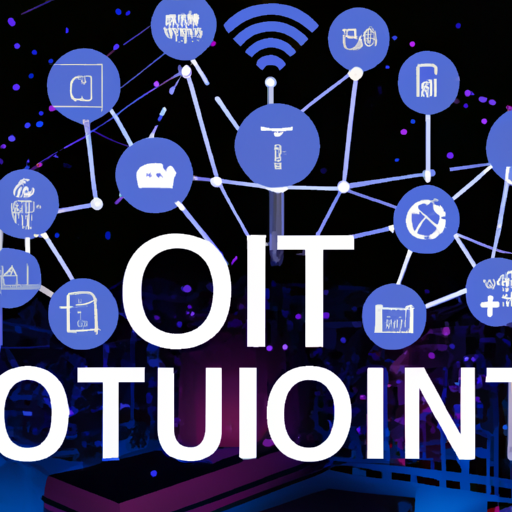-
Table of Contents
“Unlock the Power of IoT: Transforming Society and the Economy for a Brighter Future”
Introduction
The Internet of Things (IoT) is a rapidly growing technology that is transforming the way we interact with the world around us. IoT is a network of physical objects, such as sensors, connected to the internet, allowing them to collect and exchange data. This technology has the potential to revolutionize the way we live, work, and play, and its impact on society and the economy is already being felt. In the future, IoT will continue to expand and become even more integrated into our lives, with the potential to revolutionize the way we interact with the world around us. This article will explore the potential impact of IoT on society and the economy, and how it could shape the future.
The Potential of IoT to Revolutionize Healthcare Delivery
The Internet of Things (IoT) is revolutionizing the way healthcare is delivered. IoT is a network of physical objects, such as medical devices, that are connected to the internet and can collect and exchange data. This technology has the potential to revolutionize healthcare delivery by providing real-time data, improving patient outcomes, and reducing costs.
IoT can provide real-time data that can be used to monitor patient health and detect potential problems before they become serious. For example, IoT-enabled medical devices can be used to monitor vital signs such as heart rate, blood pressure, and oxygen levels. This data can be used to detect changes in a patient’s condition and alert healthcare providers to intervene before the patient’s condition worsens.
IoT can also improve patient outcomes by providing more accurate and timely diagnoses. For example, IoT-enabled medical devices can be used to collect data from a patient’s body and send it to a doctor for analysis. This data can be used to diagnose a patient more quickly and accurately than traditional methods.
Finally, IoT can reduce healthcare costs by streamlining processes and eliminating unnecessary tests and treatments. For example, IoT-enabled medical devices can be used to monitor a patient’s condition and alert healthcare providers when a treatment is no longer necessary. This can help reduce the cost of healthcare by eliminating unnecessary tests and treatments.
The potential of IoT to revolutionize healthcare delivery is clear. By providing real-time data, improving patient outcomes, and reducing costs, IoT can help make healthcare more efficient and effective. As the technology continues to evolve, it is likely that IoT will become an integral part of healthcare delivery in the future.
The Role of AI in the Future of IoT
The Internet of Things (IoT) is a rapidly growing technology that is transforming the way we interact with the world around us. IoT devices are becoming increasingly commonplace in our homes, workplaces, and public spaces, and they are being used to automate and streamline a wide range of tasks. As the IoT continues to evolve, Artificial Intelligence (AI) is playing an increasingly important role in its development.
AI is being used to improve the performance of IoT devices and to make them more efficient. AI algorithms can be used to analyze data from IoT devices and identify patterns and trends that can be used to optimize their performance. AI can also be used to automate certain tasks, such as controlling the temperature in a room or adjusting the lighting in a space.
AI is also being used to improve the security of IoT devices. AI algorithms can be used to detect anomalies in data from IoT devices and alert users to potential security threats. AI can also be used to detect malicious activity on IoT networks and take appropriate action to protect the network.
AI is also being used to improve the user experience of IoT devices. AI algorithms can be used to analyze user behavior and provide personalized recommendations and services. AI can also be used to automate certain tasks, such as setting up a device or configuring its settings.
In the future, AI will continue to play an important role in the development of the IoT. AI algorithms will be used to improve the performance of IoT devices, enhance their security, and improve the user experience. AI will also be used to automate more complex tasks, such as managing large-scale IoT networks and providing predictive analytics. As AI continues to evolve, it will become an integral part of the IoT and will help to make it more efficient and secure.
The Impact of IoT on Privacy and Security
The Internet of Things (IoT) is a rapidly growing technology that is transforming the way we interact with the world around us. IoT devices are connected to the internet and can collect and share data, allowing us to control and monitor our environment in ways that were not possible before. However, this increased connectivity also brings with it a number of privacy and security concerns.
The most significant privacy concern with IoT is the potential for data collection and misuse. IoT devices are constantly collecting data about their environment, which can include sensitive information such as location, health data, and financial information. This data can be used to create detailed profiles of individuals, which can then be used for targeted advertising or other purposes. Additionally, the data collected by IoT devices can be vulnerable to hacking, allowing malicious actors to access and misuse the data.
The security of IoT devices is also a major concern. IoT devices are often connected to the same network as other devices, making them vulnerable to attack. Additionally, many IoT devices have weak security protocols, making them easy targets for hackers. Furthermore, the lack of standardization in the IoT industry means that many devices are not properly secured, leaving them open to attack.
In order to address these concerns, it is important for organizations to take steps to ensure the security and privacy of their IoT devices. This includes implementing strong security protocols, encrypting data, and regularly updating devices with the latest security patches. Additionally, organizations should ensure that their IoT devices are properly configured and monitored to detect any suspicious activity.
The increasing prevalence of IoT devices in our lives means that it is more important than ever to ensure that our data is secure and our privacy is respected. By taking the necessary steps to protect our data and our devices, we can ensure that the benefits of IoT are realized without compromising our security or privacy.
The Benefits and Challenges of IoT for Businesses
The Internet of Things (IoT) is a rapidly growing technology that is transforming the way businesses operate. IoT is a network of physical objects, such as sensors, connected to the internet, which can collect and exchange data. This technology has the potential to revolutionize the way businesses operate, providing them with unprecedented access to data and insights.
The benefits of IoT for businesses are numerous. IoT can help businesses increase efficiency and reduce costs by automating processes and providing real-time data. This data can be used to make informed decisions and optimize operations. IoT can also help businesses improve customer service by providing personalized experiences and insights into customer behavior. Additionally, IoT can help businesses increase their competitive advantage by providing them with a better understanding of their customers and the market.
Despite the many benefits of IoT, there are also some challenges that businesses must consider. Security is a major concern, as IoT devices can be vulnerable to cyberattacks. Additionally, businesses must ensure that their data is properly managed and stored, as well as comply with data privacy regulations. Finally, businesses must also consider the cost of implementing and maintaining an IoT system.
Overall, the benefits of IoT for businesses far outweigh the challenges. By leveraging the power of IoT, businesses can gain access to valuable data and insights, automate processes, and improve customer service. However, businesses must also be aware of the potential security and cost implications of implementing an IoT system.
How IoT is Transforming the Way We Live and Work
The Internet of Things (IoT) is revolutionizing the way we live and work. IoT is a network of physical objects, such as sensors, connected to the internet, which can collect and exchange data. This technology is transforming the way we interact with our environment, allowing us to monitor and control our homes, workplaces, and cities in ways that were previously impossible.
In the home, IoT is making it easier to manage energy use, automate tasks, and improve security. Smart thermostats, for example, can be programmed to adjust the temperature in a home based on the time of day or the presence of occupants. Smart lighting systems can be programmed to turn lights on and off based on occupancy or time of day. Smart security systems can be used to monitor and control access to a home, and can even be integrated with other home automation systems.
In the workplace, IoT is being used to improve efficiency and productivity. Sensors can be used to monitor the performance of machines and equipment, allowing for predictive maintenance and improved efficiency. IoT can also be used to track the location of assets and personnel, allowing for better resource management.
In cities, IoT is being used to improve public safety, reduce traffic congestion, and improve air quality. Sensors can be used to monitor traffic flow and detect accidents, allowing for faster response times. Smart streetlights can be used to reduce energy consumption and improve public safety. Air quality sensors can be used to monitor air pollution levels and alert authorities when levels become too high.
IoT is transforming the way we live and work, making it easier to manage our environment and improve efficiency. As the technology continues to evolve, it will open up new possibilities for how we interact with our environment and each other.
Conclusion
The future of IoT is bright and its potential impact on society and the economy is immense. IoT has the potential to revolutionize the way we live, work, and interact with each other. It can enable us to make better decisions, increase efficiency, and reduce costs. IoT can also help us to better understand our environment and create new opportunities for businesses. As the technology continues to evolve, it will become increasingly important for businesses to understand and leverage the power of IoT to remain competitive and successful.




